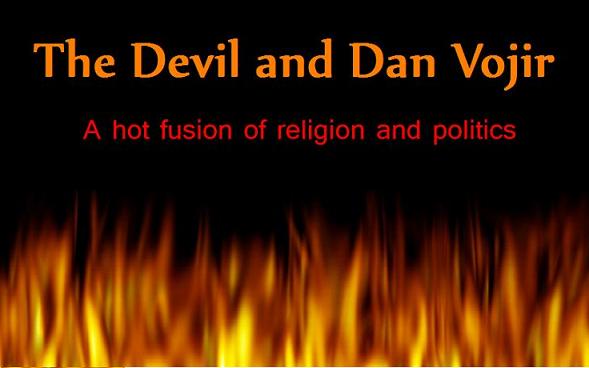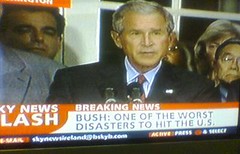Score: McClellan 14, Bush Administration 935! VICTORY!!
There was a study made by Center for Public Integrity and its affiliated group, the Fund for Independence in Journalism. According to the study, Bush and seven top officials -- including Vice President Dick Cheney, former Secretary of State Colin Powell and then-National Security Adviser Condoleezza Rice -- made 935 false statements about Iraq during those two years.
The study was based on a searchable database compiled of primary sources, such as official government transcripts and speeches, and secondary sources -- mainly quotes from major media organizations.
The study says Bush made 232 false statements about Iraq and former leader Saddam Hussein's possessing weapons of mass destruction, and 28 false statements about Iraq's links to al Qaeda.
Here are the exact 14 statements made by McClellan:
- November 12, 2002: And—but I would also reiterate what I said earlier, that we do not need any more proof that Saddam Hussein possesses and is willing to use chemical and biological weapons.
- November 13, 2002: We have made that clear, that Iraq does possess chemical and biological weapons. And what we are doing is to—what we are working to do right now with the international community, speaking with one voice, is to disarm Saddam Hussein of those weapons of mass destruction. We know that he possesses chemical and biological weapons. And we know that he seeks to acquire nuclear weapons.
- November 14, 2002: And it spells clearly out in the resolution what the regime in Iraq needs to do to disarm.
- February 10, 2003: And this is a—if Saddam Hussein is not making a drastic change in course in showing that he is going to disarm. . .
- February 10, 2003: There is a short period of time left for Saddam Hussein to disarm before the United Nations Security Council must come together and show its relevance by enforcing 1441.
- April 16, 2003: One of the reasons—one of the primary reasons that we had to take action in Iraq was because of that danger that is posed by a regime like Saddam Hussein's that possesses weapons of mass destruction and has supported terrorists in the past. And now we've gone after terrorist camps in Iraq, we arrested this—captured this terrorist yesterday. And that is a reminder of the danger that can be posed when you marry a regime with weapons of mass destruction with terrorists.
- July 16, 2003: Well, the case against Saddam Hussein and his regime was solid and compelling. There was never any discussion about whether or not Saddam Hussein had weapons of mass destruction or weapons of mass destruction program until recently. That's only recently come into play. The debate was about how to confront these weapons of mass destruction. It was about how to confront a regime that was willing to use these weapons of mass destruction.
- July 16, 2003: I differ. I think we're beginning to learn the truth and we've seen some of the evidence of Saddam Hussein's desire to seek nuclear weapons, going back quite a while. We've seen some of the evidence of his weapons of mass destruction program through two mobile biological weapon labs that have been discovered.
- July 16, 2003: Absolutely not. The president has been very straightforward about this from the beginning. He laid out a very compelling case, a very clear case. It was based on solid evidence and it was based on a number of factors. It was based on Saddam Hussein's past history of not only having chemical and biological weapons, but being willing to use those chemical and biological weapons. It was based on UNSCOM's [United Nations Special Commission] report from 1999, it's [sic] final report to the United Nations Security Council, saying he has large stockpiles of unaccounted for biological and chemical weapons. It was based on his support for terrorists and his support for—and his harboring of terrorists. So there are a number of compelling parts of this evidence that led to us confronting this threat. And the last thing the president wanted to do was go to war. But Saddam Hussein, for 12 years, was defying the international community, he was defying the United Nations and 17 resolutions. The United Nations Security Council Resolution 1441, that final resolution made it very clear, this is a final opportunity to comply, final opportunity to disarm.
- July 17, 2003: We're talking about one piece of information about Iraq reconstituting its nuclear weapons program. There were a number of other factors that justified that statement, and we stand by it. And that overall reconstitution of its nuclear weapons program was one part of a much larger body of evidence of the threat that we needed to confront, and that was posed by Saddam Hussein. Saddam Hussein talked openly about his nuclear Mujahideen, the nuclear holy warriors, his scientists that he kept in close contact with about reconstituting his nuclear weapons program.
- July 18, 2003: I think that when you look at the information that was released, it shows further how clear and compelling this case was regarding the threat that we faced in Iraq, and that we ended in Iraq. Saddam Hussein is gone and his regime is no longer a threat of using these weapons of mass destruction.
- July 22, 2003: He was an individual that possessed chemical and biological weapons, and sought to reconstitute his nuclear weapons program. He was an individual that had used chemical weapons on his own people in the past. So Iraq was a very unique situation, and it was a part—it was part of our broader effort to win the war on terrorism.
- July 23, 2003: I think we made it very clear that we are confident that we will uncover the full extent of Saddam Hussein's weapons of mass destruction program.
- July 25, 2003: We're confident that we will uncover the full extent of the weapons of mass destruction programs.





Colin Powell: 254
Donald Rumsfeld: 109
Dick Cheney: 18
Condoleeza Rice: 56
George Bush: 232
Sorry, Scott - Your score puts you in dead last!
(politically speaking, of course)







